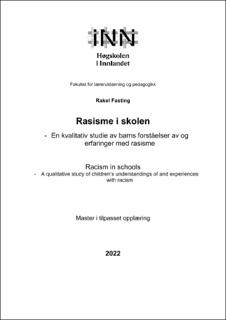| dc.contributor.advisor | | |
| dc.contributor.author | Fasting, Rakel | |
| dc.date.accessioned | 2022-09-20T16:11:55Z | |
| dc.date.available | 2022-09-20T16:11:55Z | |
| dc.date.issued | 2022 | |
| dc.identifier | no.inn:inspera:111369988:30848621 | |
| dc.identifier.uri | https://hdl.handle.net/11250/3019376 | |
| dc.description.abstract | Målet for arbeidet med oppgaven har vært å utvikle dypere innsikt i elever på mellomtrinnet sin forståelse av og erfaringer med fenomenet rasisme. Dette danner utgangspunkt for oppgavens problemstilling: Hvilke forståelser og erfaringer har elever på mellomtrinnet med fenomenet rasisme? Oppgaven er en kvalitativ studie gjennomført på en flerkulturell skole i Oslo. Oppgavens empiriske grunnlag er innhentet gjennom en to-delt innsamlingsprosess. De åtte deltakerne i studien deltok først i en gruppesamtale der de diskuterte samtalekort knytte til hverdagsrasisme. Det var fire deltakere i hver gruppe. I etterkant av gruppesamtalene gjennomførte jeg individuelle livsverdenintervju, der deltakerne i større grad ble oppfordret til å dele egne erfaringer. Kritisk raseteori (Delgado & Stefancic, 2017; Ladson-Billings, 1998) danner det teoretiske rammeverket for oppgaven, med et spesielt fokus på perspektivene rase som sosial konstruksjon, rasialisering og fargeblindhet. Kritisk raseteori bidrar til å gi en utvidet forståelse av hvordan man kan forstå fenomenet rasisme. I analysen vil jeg drøfte empirien med utgangspunkt i de ulike perspektivene presenter i kritisk raseteori og tidligere forskning.
Analyse- og drøftingskapitlet er delt i tre. I første og andre del undersøker jeg elevenes uttalte forståelse av og erfaringer med fenomenet rasisme. I deres uttalte forståelse av fenomenet rasisme fremstår hudfarge, ansiktstrekk og til en viss grad religion som avgjørende for hvem deltakerne mener kan oppleve rasisme. Deres forståelse av rasebegrepet ligner dermed en forståelse av rase som noe sosialt konstruert (Delgado & Stefancic, 2017; Ladson-Billings, 1998). Alle deltakerne i studien har flere og ulike erfaringer med rasisme, både på skolen og i fritiden. Erfaringene de deler tar alle utgangspunkt i opplevd hverdagsrasisme, og det er få direkte referanser til strukturell rasisme. Seks av deltakerne knytter den uttalte forståelsen tett opp mot egne erfaringer. I tredje del av analyse og drøftingskapitlet drøfter jeg om og hvordan deltakernes erfaringer bidrar til det jeg tolker som en form for utenforskap. Her finner jeg at deltakerne kategoriserer seg selv og hverandre som ikke-norske og utlendinger med utgangspunkt i ytre kjennetegn. Deltakerne beskriver også det jeg tolker som en rasialisering fra majoriteten der de implisitt gir uttrykk for at det å tilhøre «de andre» gjør at de kan tillegges negative egenskaper. I denne delen av analysen og drøftingen reflektere deltakerne rundt systemisk rasisme, selv om de ikke eksplisitt gir uttrykk for en forståelse av dette. | |
| dc.description.abstract | The aim of this master thesis is to gain deeper insight into learners at the intermediate level's understanding of and experiences with the phenomenon of racism. This forms the basis for my research question: “What understanding of and experiences with the phenomenon racism do students at the intermediate level have?” The thesis is a qualitative study conducted at a multicultural school in Oslo. The empirical basis for the study has been obtained through a two-part collection process. The eight participants in the study were first introduced to a group discussion where they discussed conversation cards related to everyday racism in groups of four. After the group discussions, I conducted individual life world interviews, where the participants were encouraged to share their individual experiences. Critical race theory (CRT) (Delgado & Stefancic, 2017; Ladson-Billings, 1998) forms the theoretical framework for the thesis, with a special focus on the perspectives of race as a social construction, racialization and colour blindness. Critical race theory helps in broadening our range of perception of how to understand the phenomenon of racism. In the analysis, I will discuss the empirical data based on perspectives as presented in critical race theory and previous research. In the first and second part of the analysis and discussion chapter, I examine the students' stated understanding of and experiences with the phenomenon of racism. In their explicit understanding of the phenomenon of racism, skin colour, facial features and to a certain extent religion, appear to be decisive for whom the participants believe can experience racism. Their understanding of the concept of race is thus close to an understanding of race as something socially constructed (Delgado and Stefancic). Six out of eight participants stated an understanding of racism close to their own experiences. All participants in the study have had several experiences with racism from different arenas, either in a school context or in their free time. The experiences they share are all based on hate speech, and there is an absence of direct references to structural racism. Six of the participants links the understanding of racism closely to their own experiences. In the third part of the analysis and discussion chapter, I discuss how the participants' experiences potentially contribute to what I interpret as a form of exclusion. Here I find that the participants categorize themselves and each other as non-Norwegians and foreigners based on external characteristics. The participants further describe what I interpret as a racialization from the majority when they implicitly express that their belonging to "the others" means that they might be attributed to negative qualities. In this last part of the analysis and discussion, the participants reflect on systemic racism, although they do not explicitly express an understanding of this term. | |
| dc.language | nob | |
| dc.publisher | Inland Norway University | |
| dc.title | Rasisme i skolen - en kvalitativ studie av barns forståelser av og erfaringer med rasisme | |
| dc.type | Master thesis | |
